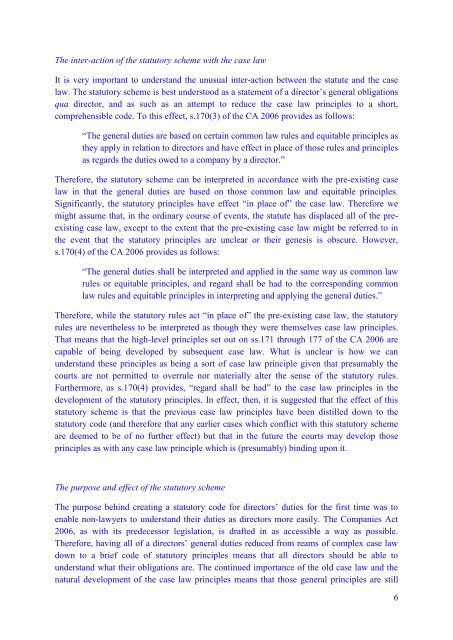Chapter 7 Directors' Duties - alastairhudson.com
Chapter 7 Directors' Duties - alastairhudson.com
Chapter 7 Directors' Duties - alastairhudson.com
Create successful ePaper yourself
Turn your PDF publications into a flip-book with our unique Google optimized e-Paper software.
The inter-action of the statutory scheme with the case law<br />
It is very important to understand the unusual inter-action between the statute and the case<br />
law. The statutory scheme is best understood as a statement of a director‟s general obligations<br />
qua director, and as such as an attempt to reduce the case law principles to a short,<br />
<strong>com</strong>prehensible code. To this effect, s.170(3) of the CA 2006 provides as follows:<br />
“The general duties are based on certain <strong>com</strong>mon law rules and equitable principles as<br />
they apply in relation to directors and have effect in place of those rules and principles<br />
as regards the duties owed to a <strong>com</strong>pany by a director.”<br />
Therefore, the statutory scheme can be interpreted in accordance with the pre-existing case<br />
law in that the general duties are based on those <strong>com</strong>mon law and equitable principles.<br />
Significantly, the statutory principles have effect “in place of” the case law. Therefore we<br />
might assume that, in the ordinary course of events, the statute has displaced all of the preexisting<br />
case law, except to the extent that the pre-existing case law might be referred to in<br />
the event that the statutory principles are unclear or their genesis is obscure. However,<br />
s.170(4) of the CA 2006 provides as follows:<br />
“The general duties shall be interpreted and applied in the same way as <strong>com</strong>mon law<br />
rules or equitable principles, and regard shall be had to the corresponding <strong>com</strong>mon<br />
law rules and equitable principles in interpreting and applying the general duties.”<br />
Therefore, while the statutory rules act “in place of” the pre-existing case law, the statutory<br />
rules are nevertheless to be interpreted as though they were themselves case law principles.<br />
That means that the high-level principles set out on ss.171 through 177 of the CA 2006 are<br />
capable of being developed by subsequent case law. What is unclear is how we can<br />
understand these principles as being a sort of case law principle given that presumably the<br />
courts are not permitted to overrule nor materially alter the sense of the statutory rules.<br />
Furthermore, as s.170(4) provides, “regard shall be had” to the case law principles in the<br />
development of the statutory principles. In effect, then, it is suggested that the effect of this<br />
statutory scheme is that the previous case law principles have been distilled down to the<br />
statutory code (and therefore that any earlier cases which conflict with this statutory scheme<br />
are deemed to be of no further effect) but that in the future the courts may develop those<br />
principles as with any case law principle which is (presumably) binding upon it.<br />
The purpose and effect of the statutory scheme<br />
The purpose behind creating a statutory code for directors‟ duties for the first time was to<br />
enable non-lawyers to understand their duties as directors more easily. The Companies Act<br />
2006, as with its predecessor legislation, is drafted in as accessible a way as possible.<br />
Therefore, having all of a directors‟ general duties reduced from reams of <strong>com</strong>plex case law<br />
down to a brief code of statutory principles means that all directors should be able to<br />
understand what their obligations are. The continued importance of the old case law and the<br />
natural development of the case law principles means that those general principles are still<br />
6













